Vaporizing vs Smoking Cannabis: What Is The Difference?
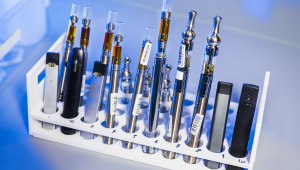
- 1. Temperature
- 2. Health affections
- 3. Costs and efficiency
- 4. What gets you higher?
- 5. Taste
- 6. Tradition
- 7. In conclusion
Smoking marijuana and consuming cannabis edibles are both activities that have been part of humans’ lives for thousands of years, even dating back as far as the years 8000 BC. So basically, when we smoke a joint we are engaging in the same activities and continuing a tradition that people have been carrying out throughout history.
Suddenly now, contemporary people have brought a new way of consuming marijuana. Yes, we’re talking about vaporizing. Vaping has become increasingly popular lately, and we can't deny it. You can probably find a vaper around almost every corner.
Whether you’ve already tried vaporizers or you’re curious to try, it’s important to know the difference between smoking and vaping. Beyond factors like temperature and taste, the main difference resides in the health affections. Given when you vape you’re actually inhaling vapor, this results in less damage to your lungs.
However, let’s get into the details.
1. Temperature
When we talk about vaporizing and smoking weed, both have in common that the mechanism by which they work is inhalation, the process of breathing in. However, the main difference between these two is the temperature at which cannabis is being consumed.
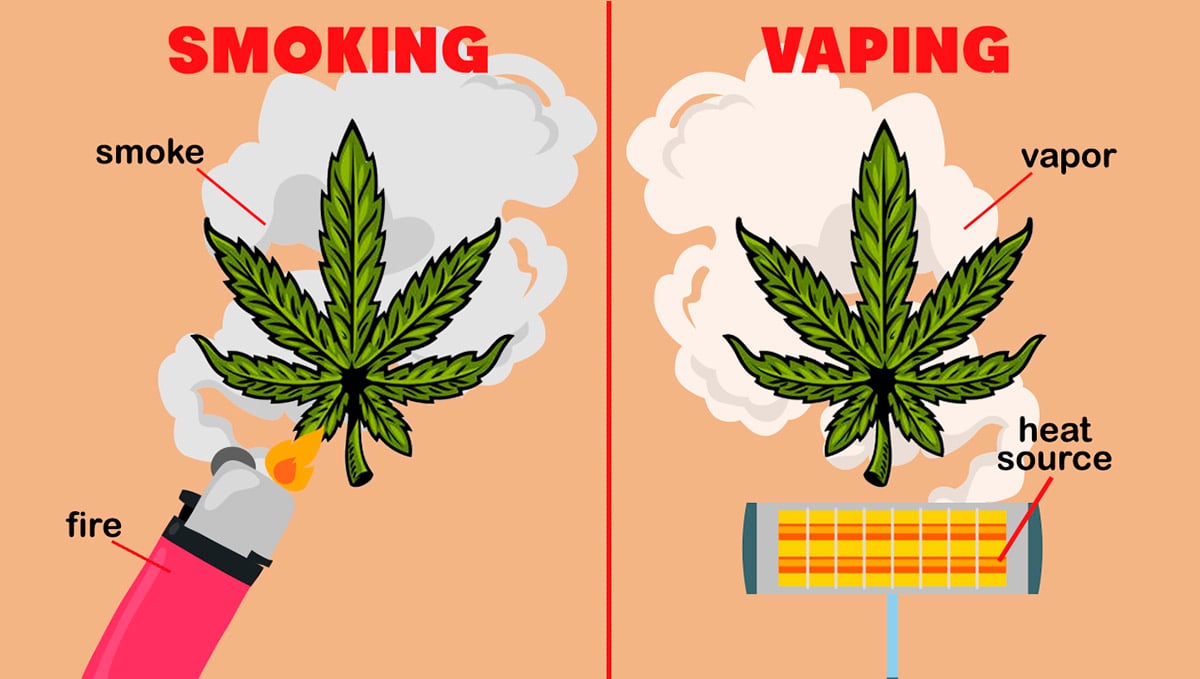
When smoking a joint, you’re heating the cannabis to the point of combustion. This means that what you inhale is smoke containing THC. Vaping, on the other hand, heats cannabis up to a much lower temperature in which it actually doesn't burn, so instead of smoke, you’re actually inhaling vapor.
Let’s take a look at the chart:
| Smoke | 80% non-cannabinoids. | 115 different components including half a dozen known PAHs. |
|---|---|---|
| Vapor | 5% non-cannabinoids. | 5% small amounts of one PAH and caryophyllene. |
As we can see, when we smoke marijuana, there is an 88% of non-cannabinoids, a.k.a. not so great components, present in the weed smoke. On the other hand, the difference is huge. Vaporizing weed contains only 5% of negative substances in its vapor, while the other 95% is full of cannabinoids, a.k.a. THC and CBD, our best friends.
2. Health Affections
Although cannabis is becoming increasingly recommended by doctors and scientists after they come to the conclusion that marijuana is a much safer alternative to opioids, for example, we have to admit it still comes along with some side health issues.
Whether you’re using cannabis oil or resin or you smoke the buds, and whether you use it for medical purposes or recreationally the biggest risk of smoking weed is the smoke itself.
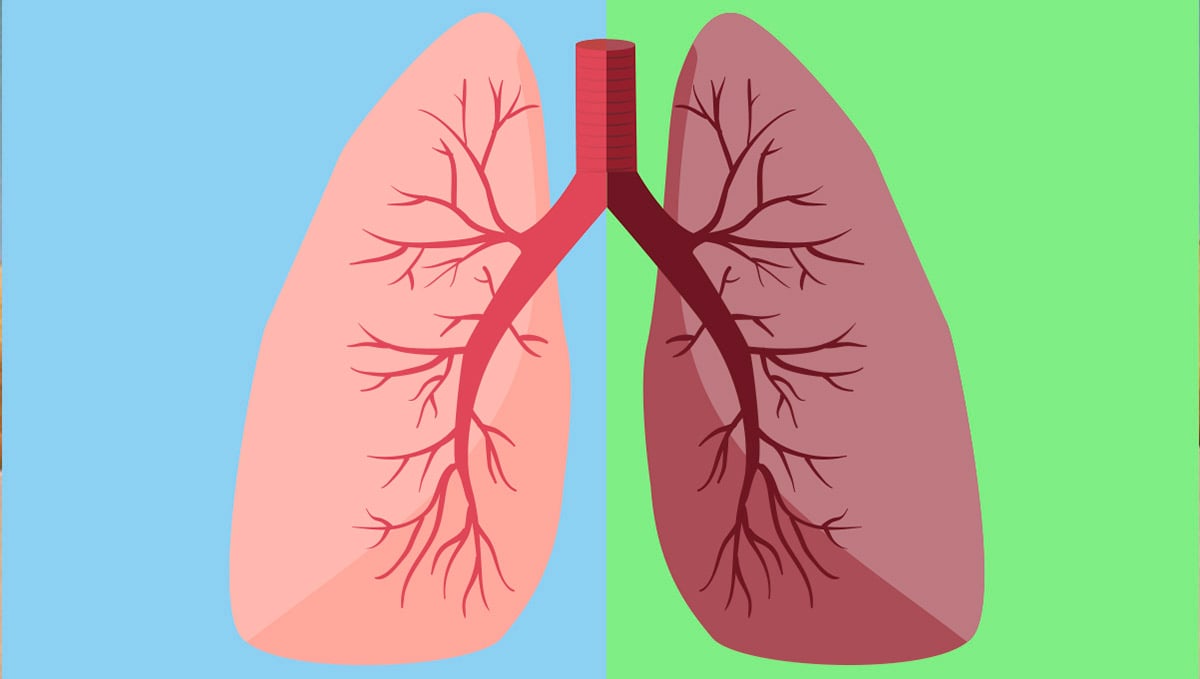
Anyways, we’re not going to say that vaporizing cannabis is healthy for you, although since what you’re inhaling when you vape isn’t actually smoke but a vapor, the negative effects it has on your lungs are considered to be less harmful.
"Like tobacco smoke, marijuana smoke is an irritant to the throat and lungs and can cause a heavy cough during use. It also contains levels of volatile chemicals and tar that are similar to tobacco smoke, raising concerns about risk for cancer and lung disease."1
When smoking a joint, using a pipe or bong, our bodies are inhaling smoke containing cannabinoids, terpenes, burnt plant matter, and carcinogenic byproducts which may have negative effects on our lungs on a long term use. However, when you're vaping these chemicals won't be found in the smoke you inhale since the temperature in which the weed is heated isn't enough to release them.
Some possible negative health effects provoked by chronic weed smoking include:
- Excessive mucus production;
- Coughing;
- Air pockets in the lungs and chest;
- Chronic bronchitis;
- Possible increased risk of lower respiratory tract infections;
- Weakened immune system;
- Wheezing.
In conclusion, vaping could be considered to be less harmful than smoking. However, more research needs to be done on vaping before we can make such an assumption, given vaping is still quite new to the society.
The first vaporizers started popping up by the year 2003, although they began to gain extreme popularity by 2015 and ahead. Besides, some studies have actually found that vaporizing could also be associated with negative effects on the lungs, but less when compared to smoking.
3. Costs and Efficiency
Economically speaking, the costs of smoking and vaping marijuana are quite similar. A gram of flower’s average price ranges between $6 to $15, depending on the quality and geographic location.
One gram of weed can last for about three bowls or 3/4 joints. So you can calculate the costs of smoking according to the amount of weed you consume daily. A regular smoker might smoke a gram in 1-3 days, which can add up to $35-$70 a week.
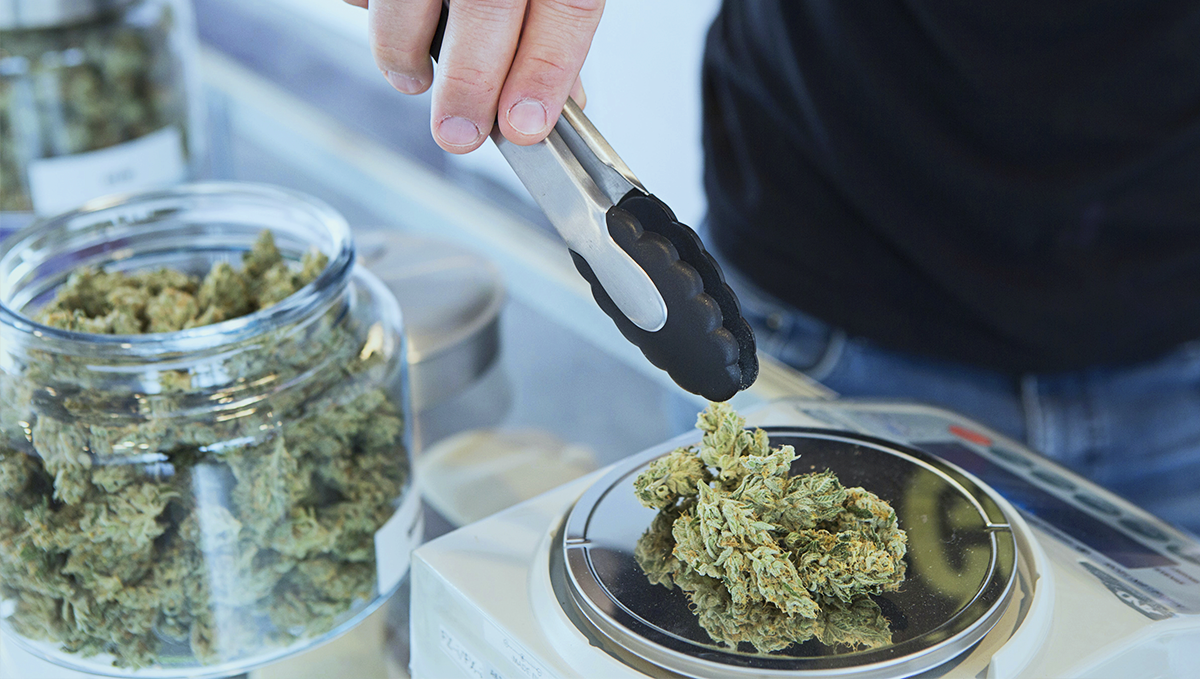
However, it is a common belief that vaping gets the most out of your buds or concentrate oil in comparison to smoking, where part of the cannabinoids gets burnt off through the back end of the joint.
Besides, it is considered that vaporized THC gets more powerful effects than smoking a joint (we’ll cover that point later), which translates to fewer amounts of weed needed to get high.
Finally, one more pro for vaping is that after you vape you could actually reuse your roasted buds to make cannabutter or even roll it up in a joint and smoke it again.
4. What Gets You Higher?
There are split thoughts on which of these two methods get you a ‘bigger high’.
Smokers will always stand by the belief that smoking gets you higher than vaping. However, a recent study led by scientists at the John Hopkins Behavioral Pharmacology Research Unit affirmed the opposite: vaporizing cannabis provides more intense effects in comparison to smoking the same doses of buds.
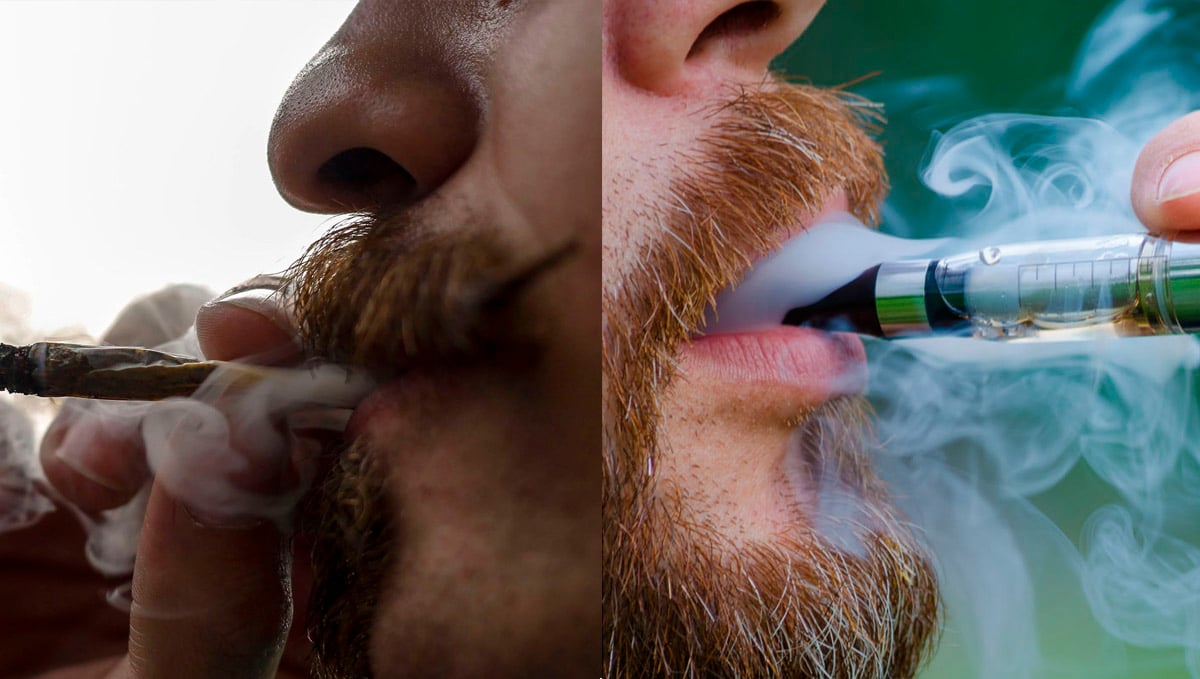
The study consisted of 17 participants who were to test the effects of smoking marijuana against vaporizing it. All of the participants were already previous cannabis users but they were asked not to smoke for the 30 days before the testing. The testing day then consisted of consuming marijuana at 6 different times between 8.5-hour breaks.
Each of the subjects was asked to smoke and vape a variety of weed products with different THC contents, from 5mg to 25mg. However, the participants weren’t told how much they were inhaling at any time in order to get a more objective analysis and results.
Once the study was finished, the JAMA Network Open concluded:
“Vaporized cannabis produced significantly greater subjective drug effects, cognitive, psychomotor impairment, and higher blood THC concentrations than the same doses of smoked cannabis”. 2
So yes, vaporizing gets you higher than smoking weed.
Nevertheless, the high you get from vaping isn’t exactly the same as the one you get from smoking a joint or a bong hit. Smoking’s effect on the body and mind is stronger, normally provoking the common feeling of tiredness or laziness. This could be alluded to the other negative toxins that the body absorbs being mistaken for the ‘high’.
When vaping, on the other hand, you’ll get a more energetic, stimulated, cleaner type of high. We should point out that at this point, the type of strain also plays a major part in the effects you’ll get.
5. Taste
There is no denying a good, high-quality vaporizer will allow you to get a clearer taste of your marijuana in comparison to smoking a joint.
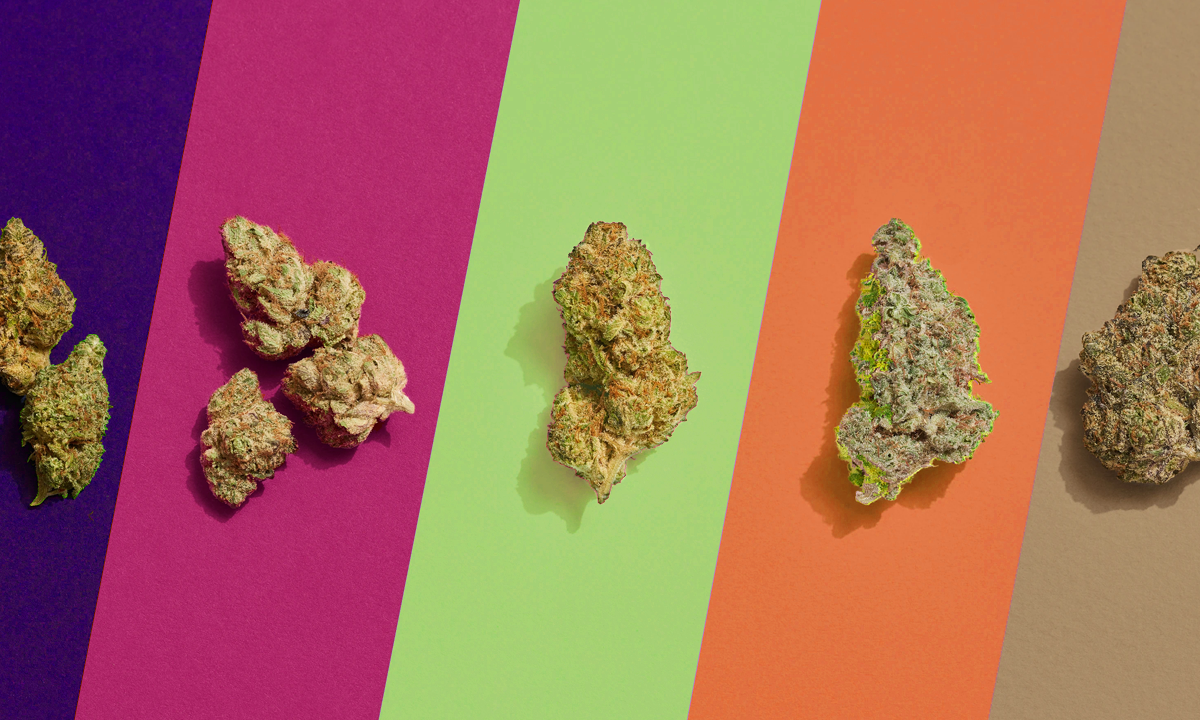
While vaping your buds, you will be able to sense the characteristics and subtle differences in flavor between strains, which you probably wouldn't be able to notice in a joint. This is because, during the combustion process, the weed goes up to such high temperatures that the terpenes, the source of flavor in cannabis, are almost wiped out.
Have you heard about our strain Gelato Auto? It is one of our strongest strains, a leveled hybrid that reaches up to 26% THC. Gelato Auto combines a mix of sweet cookie flavorings and zesty citrus which make it the perfect strain to try with a vaporizer.
6. Tradition
When it comes to rituals, nothing will ever beat the moment of sitting down, grinding, and rolling a joint. This is a process many regular smokers cherish almost just as much as the smoking process. And not to mention the traditional round with friends passing a joint.
As we mentioned, weed has become a ritual since it’s origins, Indians used to treat it as a religious plant and it would be the center of their special traditions. And when we say tradition we’re not only talking about the old days.
Think of all the stoner movies you've probably watched. We can't come with an image the kids at Dazed and Confused sitting on a vaping round, nor one of Seth Rogen and James Franco vaping on one of our favorite movies, Pineapple Express.

In fact, we loved this movie so much it actually inspired us to create our own Fast Buds' original Pineapple Express strain, a balanced Sativa-Indica hybrid with 20% THC.
So, what we mean is, part of the magic is sort of lost the moment you pull out a vaporizer out of your pocket. Rolling a joint comes along with the taste of connecting with your friends and sharing a moment together. What would happen with all those hot boxes in the car, or in your parents’ bathroom while they are on a trip if everyone in the world stopped smoking joints and switched to vaping?
However, perhaps this is just an outdated way of thinking and we might have to reconsider this aspect in the near future, but for now -and in our opinion- when it comes to tradition, joints take the victory among the ’60s, '70s, '80s and '90s generation of stoners. Perhaps vaping will be the new joints-rolling for the centennial generation. As for millennials, we think we’ll stick to smoking mainly joints, and yes, maybe try vaping, why not?
7. In Conclusion
There are many differences between vaporizing and smoking cannabis. Both of them prove to have their pros and cons but to your advantage, you don't really need to choose between one or the other, you can switch! Just make sure you are aware of the risks and benefits of each method.
MEDICAL DISCLAIMER
This content is for educational purposes only. The information provided is derived from research gathered from external sources.
EXTERNAL REFERENCES
- "What are marijuana's effects on lung health?" National Institue on Drug Abuse, 2020 - https://www.drugabuse.gov/publications/research-reports/marijuana/what-are-marijuanas-effects-lung-health
- "Vaping Cannabis Produces Stronger Effects Than Smoking Cannabis For Infrequent Users" JAMA Network Open, 2018 - https://www.hopkinsmedicine.org/news/newsroom/news-releases/vaping-cannabis-produces-stronger-effects-than-smoking-cannabis-for-infrequent-users










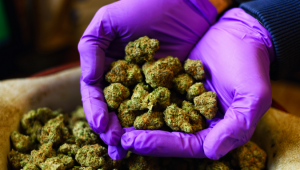
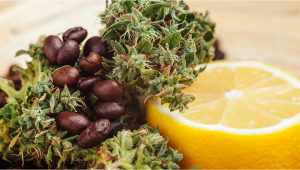


Comments